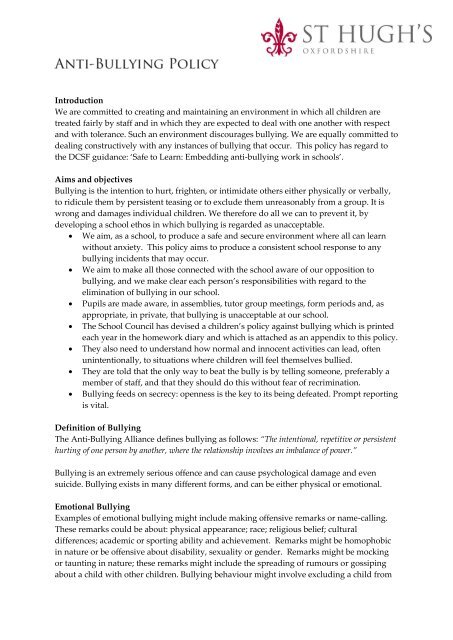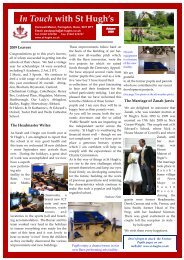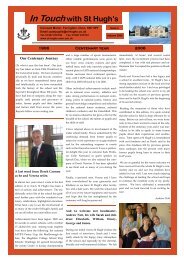Create successful ePaper yourself
Turn your PDF publications into a flip-book with our unique Google optimized e-Paper software.
Introduction<br />
We are committed to creating and maintaining an environment in which all children are<br />
treated fairly by staff and in which they are expected to deal with one another with respect<br />
and with tolerance. Such an environment discourages bullying. We are equally committed to<br />
dealing constructively with any instances of bullying that occur. This policy has regard to<br />
the DCSF guidance: ‘Safe to Learn: Embedding anti-bullying work in schools’.<br />
Aims and objectives<br />
<strong>Bullying</strong> is the intention to hurt, frighten, or intimidate others either physically or verbally,<br />
to ridicule them by persistent teasing or to exclude them unreasonably from a group. It is<br />
wrong and damages individual children. We therefore do all we can to prevent it, by<br />
developing a school ethos in which bullying is regarded as unacceptable.<br />
We aim, as a school, to produce a safe and secure environment where all can learn<br />
without anxiety. This policy aims to produce a consistent school response to any<br />
bullying incidents that may occur.<br />
We aim to make all those connected with the school aware of our opposition to<br />
bullying, and we make clear each person’s responsibilities with regard to the<br />
elimination of bullying in our school.<br />
Pupils are made aware, in assemblies, tutor group meetings, form periods and, as<br />
appropriate, in private, that bullying is unacceptable at our school.<br />
The School Council has devised a children’s policy against bullying which is printed<br />
each year in the homework diary and which is attached as an appendix to this policy.<br />
They also need to understand how normal and innocent activities can lead, often<br />
unintentionally, to situations where children will feel themselves bullied.<br />
They are told that the only way to beat the bully is by telling someone, preferably a<br />
member of staff, and that they should do this without fear of recrimination.<br />
<strong>Bullying</strong> feeds on secrecy: openness is the key to its being defeated. Prompt reporting<br />
is vital.<br />
Definition of <strong>Bullying</strong><br />
The <strong>Anti</strong>-<strong>Bullying</strong> Alliance defines bullying as follows: “The intentional, repetitive or persistent<br />
hurting of one person by another, where the relationship involves an imbalance of power.”<br />
<strong>Bullying</strong> is an extremely serious offence and can cause psychological damage and even<br />
suicide. <strong>Bullying</strong> exists in many different forms, and can be either physical or emotional.<br />
Emotional <strong>Bullying</strong><br />
Examples of emotional bullying might include making offensive remarks or name-calling.<br />
These remarks could be about: physical appearance; race; religious belief; cultural<br />
differences; academic or sporting ability and achievement. Remarks might be homophobic<br />
in nature or be offensive about disability, sexuality or gender. Remarks might be mocking<br />
or taunting in nature; these remarks might include the spreading of rumours or gossiping<br />
about a child with other children. <strong>Bullying</strong> behaviour might involve excluding a child from
social or activity groups with the intention of offending; threats and intimidating behaviour<br />
might be used; the sending of hurtful text messages by mobile ‘phone, email or posted on<br />
social websites; the taking of or damage caused to a child's belongings in order to cause<br />
distress.<br />
Physical <strong>Bullying</strong><br />
This might include kicking, hitting or pushing with the intention of physically hurting the<br />
child. The common element in all of these forms is that the ‘bully' intends to cause physical<br />
or emotional pain.<br />
Symptoms of <strong>Bullying</strong><br />
There is no science to spotting when a pupil is being bullied, and intuition is likely to be the<br />
most important tool. However, behaviour as listed below may suggest a pattern of bullying:<br />
Persistently low morale, perhaps tearfulness.<br />
Mood swings.<br />
An unwillingness to come to school.<br />
A reluctance to be involved in peer activities.<br />
A decline in academic achievement.<br />
Awareness of staff and children to the school's policy on bullying<br />
In each autumn term, the Deputy Head (Pastoral) holds an assembly on the theme of<br />
bullying at school. This takes place during week where the assembly theme is ‘<strong>Anti</strong><br />
<strong>Bullying</strong>’ and this subject is covered in the PSHE programme and through circle time, drama<br />
and in ‘Forum’ periods. The children discuss what constitutes bullying, and they are<br />
reminded of the procedure for the reporting of bullying. Appropriate INSET training is<br />
provided to staff and courses made available so that everyone is aware of the strategies to<br />
deal with bullying in the school. All staff are provided with copies of this policy which is<br />
discusses and reviewed by them on a regular basis.<br />
<strong>St</strong>aff supervision of pupils is an essential ingredient in the school’s strategy against bullying<br />
and it is especially important that staff are vigilant in play times, meal times and break times<br />
for any potential incidents. Places such as the changing rooms, corridors and the woods<br />
need to be carefully patrolled as these would be the areas where bullying could occur. The<br />
School Council has drawn up a pupils’ policy against bullying and they review this each<br />
year. It is contained on the homework diary given to all Middle School and Upper School<br />
children<br />
Dealing with bullies<br />
There needs to be a careful investigation as to what is happening and where and when the<br />
alleged bullying is taking place - we need to remember our responsibilities to all parties<br />
involved. We keep Concerns/Incidents Record Forms in the staff room where we record all<br />
incidents of bullying that occur both inside and outside lesson time. In addition to this each<br />
child has a pastoral record form which would need to be completed. If any adult witnesses<br />
an act of bullying, they should record the event in the files. The Deputy Head (Pastoral)<br />
checks the record forms daily before taking action and making further notes on pupils’ files.<br />
In this way, patterns of bullying can be identified.
Bullies should be made aware of the misery they are causing and to see their<br />
behaviour through the eyes of the victim.<br />
They should be asked to suggest ways in which they could help the victim.<br />
The situation should be carefully monitored and both the victim and the bully be<br />
asked, separately, if things have improved. (In most cases, the above procedure is<br />
successful)<br />
Punishment may be counter-productive but if bullying persists, one, or a<br />
combination, of the following steps may be taken:<br />
o The bully will lose breaktime privileges.<br />
o A formal commitment will be signed by the bully, countersigned by the<br />
headmaster or Deputy Head (Pastoral). Parents will be sent for and asked for<br />
support re sanctions, etc.<br />
o In extreme cases, suspension or expulsion will be considered and/or referral<br />
to psychiatric help required.<br />
It is hoped that success can be achieved more by improving the understanding and selfesteem<br />
of the parties involved, rather than relying too much on sanctions, which run the risk<br />
of producing negative results. It is above all important to preserve an atmosphere in which<br />
all are respected and valued.<br />
<strong>St</strong>aff procedure for the recording and reporting of bullying<br />
Incidents or patterns of bullying should be reported the Deputy Head (Pastoral) using the<br />
‘Concerns/Incidents Record Form’ who subsequently records the information on the<br />
relevant pupils’ pastoral record forms and where appropriate posts a copy on the staff room<br />
notice board. The incident should then be discussed with the member of staff who reported<br />
it, and a decision would be made as to how to deal with the incident or pattern of behaviour.<br />
Where appropriate, the Deputy Head (Pastoral) would liaise with the Form Teacher and<br />
decide on an appropriate course of action. He would then talk to the pupils concerned to<br />
gain a clearer idea of the reported bullying. If the incident was considered particularly<br />
serious, or the bully failed to change his/her behaviour despite guidance from teachers, the<br />
parents of all children concerned may be contacted.<br />
When the members of staff involved are satisfied that the issue has been resolved, at least in<br />
the short-term, a copy of the paper trail would be kept in each of the following:<br />
<br />
<br />
<br />
<br />
The ‘Concerns/Incidents Record Forms’ kept in the <strong>St</strong>aff Room.<br />
The individual file of the child kept in the relevant staff room.<br />
It is usually necessary to keep a copy in the file of the ‘bully' and the ‘bullied' child.<br />
Recurring or particularly nasty cases of bullying would be brought up in the <strong>St</strong>aff<br />
Meetings and in the Senior Management Meeting. However, if considered necessary,<br />
the Headmaster or other members of the SMT should be consulted sooner.<br />
The role of parents<br />
Parents who are concerned that their child might be being bullied, or who suspect that their<br />
child may be the perpetrator of bullying, should contact their child’s class teacher, tutor or<br />
senior member of staff immediately. Parents have a responsibility to support the school’s
anti-bullying policy and actively to encourage their child to be a positive member of the<br />
school.<br />
Boarding<br />
This policy is not only provided to the parents of boarders but it is available and<br />
known to staff and boarders, including junior and recently appointed staff.<br />
There are no ‘initiation ceremonies’ intended to cause pain, anxiety or humiliation.<br />
Through discussions we have determined that pupils do not identify bullying as a<br />
problem in the school.<br />
If bullying does occur then the victim would be suitably supported, and the bully<br />
would be given suitable support and guidance.<br />
Monitoring and review<br />
This policy is monitored by the Headmaster and SMT, and it is made available to governors<br />
and parents.<br />
Reviewed: September 2012<br />
Review date: September 2013
Our <strong>Policy</strong> Against <strong>Bullying</strong><br />
It is important for everyone in the school to feel that they are safe and happy.<br />
No-one should feel afraid to take action by seeking help if they are unhappy or notice<br />
someone else who is upset. Everyone needs to take positive steps to make sure that<br />
<strong>St</strong> Hugh’s is a happy and a trusting school where bullies - of any sort - are not<br />
tolerated.<br />
What is bullying?<br />
If you repeatedly do something which deliberately makes someone else unhappy then<br />
you are probably bullying them.<br />
<strong>Bullying</strong> can be physical:<br />
<br />
<br />
<br />
<br />
Hitting another person<br />
Ganging up on someone<br />
A repeated kick or punch to someone in a passage or corridor<br />
Pushing or shoving with the aim of causing hurt or humiliation<br />
<strong>Bullying</strong> can be verbal:<br />
<br />
<br />
<br />
<br />
<br />
<br />
<br />
Sneering at someone (and encouraging others to do the same) for lack of<br />
success in sport or work. Sometimes being too successful can attract envy<br />
Having fun at someone else’s expense<br />
Constant criticism of someone because of the way they look, or behave<br />
Deliberately leaving someone out of your games and conversations<br />
Being unkind in your language, particularly when addressed to one person<br />
Making it clear that you do not like someone, and persuading others to follow<br />
your lead<br />
Intentionally taking, hiding or damaging someone's property is also bullying<br />
What can I do to stop it?<br />
If you spot an incident of bullying you should take steps to stop it by doing one or more<br />
of these things:<br />
<br />
<br />
<br />
<br />
Tell a member of staff<br />
Tell your parents<br />
Tell an another pupil, preferably an older one<br />
Tell a friend or any other child whom you trust
Point out to the bully- if you are brave enough - that such behaviour is<br />
unacceptable<br />
Never meet violence with violence. If you take the law into your own hands you may be<br />
the one who ends up in trouble.<br />
Physical bullying is easy to spot but other forms of bullying are just as hurtful and<br />
probably just as dangerous in undermining confidence and causing unhappiness. No one<br />
likes a bully although some may appear to, simply because they are afraid of him or her.<br />
Although children often bully in groups the leader is often the only active bully and the<br />
rest have been pressurised into joining in or they will be bullied themselves. This is the<br />
'if you can't beat them join them' technique. The followers of the leader don't<br />
realise that if they left the leader he would be the weakest of them all.<br />
It is up to everyone in the school to make sure that bullying is not tolerated. This<br />
requires courage, sticking up for your friends and telling the truth. To tell on a bully is<br />
for the good of everyone - the victim, the bully and the whole school community. Not<br />
telling is making the situation worse for everyone.<br />
To whom do I turn for help?<br />
If you feel you are being bullied, then the really important thing to do is to tell<br />
someone. The situation will not get worse, it will get better and you will feel happier<br />
once it has been dealt with. Here is a list of people who can help and a suggestion of<br />
places where you can find a listening ear in confidence, or to whom you could pass a<br />
note if you felt worried about speaking to them :<br />
Who ? Where ?<br />
Your parents<br />
At home or at work<br />
A friend<br />
Anywhere<br />
Any member of staff <strong>St</strong>aff Room / Class room<br />
Your form teacher<br />
Class room / <strong>St</strong>aff Room<br />
Your tutor<br />
Class room / <strong>St</strong>aff Room<br />
The house parents<br />
The boarding house<br />
Mr Nott<br />
In his <strong>St</strong>udy<br />
Mr Avery<br />
Classroom/ <strong>St</strong>aff room<br />
Mr Matthews<br />
Classroom/ <strong>St</strong>aff room<br />
Miss Creed<br />
Classroom / <strong>St</strong>aff room<br />
Matrons<br />
In the Day Room<br />
Childline 0800 1111<br />
Our independent listener Mrs Rayne – 01367 870215<br />
TAKE ACTION – DON’T TOLERATE BULLYING!<br />
<strong>St</strong> Hugh’s School Council






